Impact of Sustainability on Profitability: UK Hospitality Industry
VerifiedAdded on 2020/12/09
|12
|3732
|72
Report
AI Summary
This report delves into the crucial role of sustainability within the UK hospitality industry. It examines the industry's impact on environmental, social, and economic factors, highlighting how these pillars influence overall profitability. The report explores the contributions of the hospitality sector to environmental issues, such as energy and water consumption, waste generation, and pollution, and how these issues affect the bottom line. It also analyzes social factors, including corporate social responsibility and cultural impacts, and their influence on customer satisfaction and business performance. Furthermore, the report investigates the economic aspects of sustainability, such as government policies, consumer behavior, and technological advancements, and their effects on revenue generation. Finally, the report emphasizes the importance of corporate sustainability management in developing effective strategies and policies that promote long-term value creation for stakeholders, ensuring ethical practices, and fostering sustainable growth within the hospitality industry.

Sustainability
Paraphrase This Document
Need a fresh take? Get an instant paraphrase of this document with our AI Paraphraser
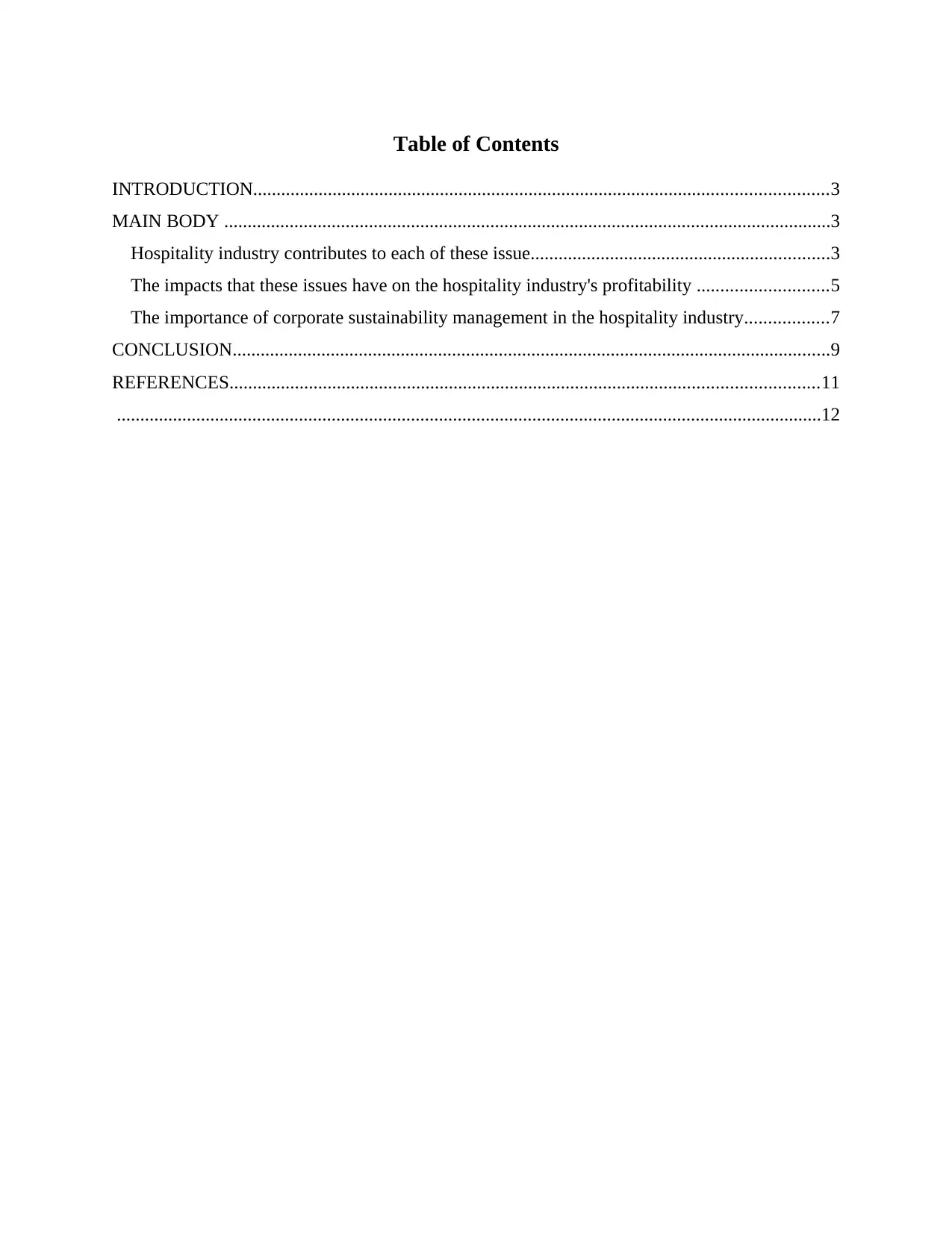
Table of Contents
INTRODUCTION...........................................................................................................................3
MAIN BODY ..................................................................................................................................3
Hospitality industry contributes to each of these issue................................................................3
The impacts that these issues have on the hospitality industry's profitability ............................5
The importance of corporate sustainability management in the hospitality industry..................7
CONCLUSION................................................................................................................................9
REFERENCES..............................................................................................................................11
.......................................................................................................................................................12
INTRODUCTION...........................................................................................................................3
MAIN BODY ..................................................................................................................................3
Hospitality industry contributes to each of these issue................................................................3
The impacts that these issues have on the hospitality industry's profitability ............................5
The importance of corporate sustainability management in the hospitality industry..................7
CONCLUSION................................................................................................................................9
REFERENCES..............................................................................................................................11
.......................................................................................................................................................12
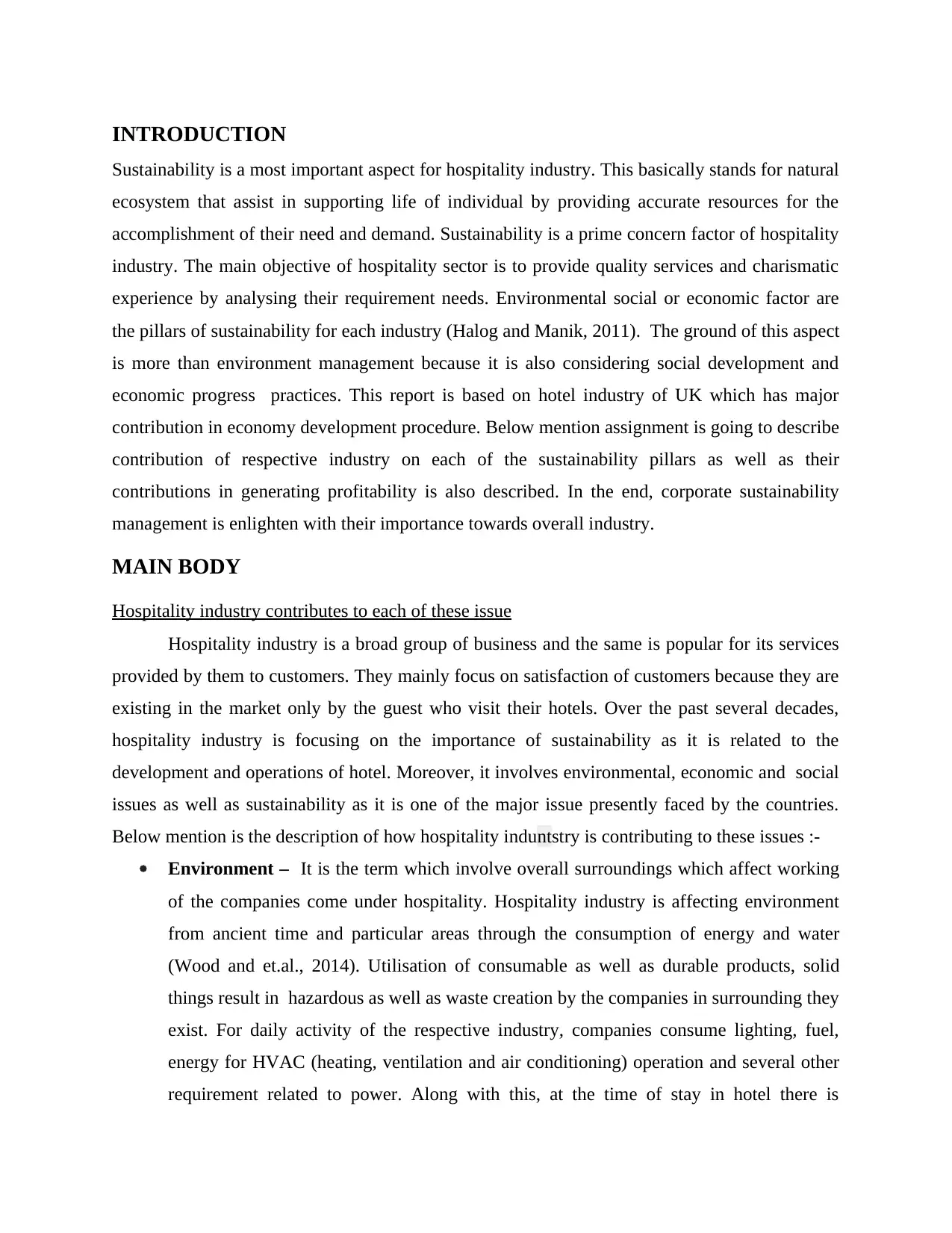
INTRODUCTION
Sustainability is a most important aspect for hospitality industry. This basically stands for natural
ecosystem that assist in supporting life of individual by providing accurate resources for the
accomplishment of their need and demand. Sustainability is a prime concern factor of hospitality
industry. The main objective of hospitality sector is to provide quality services and charismatic
experience by analysing their requirement needs. Environmental social or economic factor are
the pillars of sustainability for each industry (Halog and Manik, 2011). The ground of this aspect
is more than environment management because it is also considering social development and
economic progress practices. This report is based on hotel industry of UK which has major
contribution in economy development procedure. Below mention assignment is going to describe
contribution of respective industry on each of the sustainability pillars as well as their
contributions in generating profitability is also described. In the end, corporate sustainability
management is enlighten with their importance towards overall industry.
MAIN BODY
Hospitality industry contributes to each of these issue
Hospitality industry is a broad group of business and the same is popular for its services
provided by them to customers. They mainly focus on satisfaction of customers because they are
existing in the market only by the guest who visit their hotels. Over the past several decades,
hospitality industry is focusing on the importance of sustainability as it is related to the
development and operations of hotel. Moreover, it involves environmental, economic and social
issues as well as sustainability as it is one of the major issue presently faced by the countries.
Below mention is the description of how hospitality induntstry is contributing to these issues :-
Environment – It is the term which involve overall surroundings which affect working
of the companies come under hospitality. Hospitality industry is affecting environment
from ancient time and particular areas through the consumption of energy and water
(Wood and et.al., 2014). Utilisation of consumable as well as durable products, solid
things result in hazardous as well as waste creation by the companies in surrounding they
exist. For daily activity of the respective industry, companies consume lighting, fuel,
energy for HVAC (heating, ventilation and air conditioning) operation and several other
requirement related to power. Along with this, at the time of stay in hotel there is
Sustainability is a most important aspect for hospitality industry. This basically stands for natural
ecosystem that assist in supporting life of individual by providing accurate resources for the
accomplishment of their need and demand. Sustainability is a prime concern factor of hospitality
industry. The main objective of hospitality sector is to provide quality services and charismatic
experience by analysing their requirement needs. Environmental social or economic factor are
the pillars of sustainability for each industry (Halog and Manik, 2011). The ground of this aspect
is more than environment management because it is also considering social development and
economic progress practices. This report is based on hotel industry of UK which has major
contribution in economy development procedure. Below mention assignment is going to describe
contribution of respective industry on each of the sustainability pillars as well as their
contributions in generating profitability is also described. In the end, corporate sustainability
management is enlighten with their importance towards overall industry.
MAIN BODY
Hospitality industry contributes to each of these issue
Hospitality industry is a broad group of business and the same is popular for its services
provided by them to customers. They mainly focus on satisfaction of customers because they are
existing in the market only by the guest who visit their hotels. Over the past several decades,
hospitality industry is focusing on the importance of sustainability as it is related to the
development and operations of hotel. Moreover, it involves environmental, economic and social
issues as well as sustainability as it is one of the major issue presently faced by the countries.
Below mention is the description of how hospitality induntstry is contributing to these issues :-
Environment – It is the term which involve overall surroundings which affect working
of the companies come under hospitality. Hospitality industry is affecting environment
from ancient time and particular areas through the consumption of energy and water
(Wood and et.al., 2014). Utilisation of consumable as well as durable products, solid
things result in hazardous as well as waste creation by the companies in surrounding they
exist. For daily activity of the respective industry, companies consume lighting, fuel,
energy for HVAC (heating, ventilation and air conditioning) operation and several other
requirement related to power. Along with this, at the time of stay in hotel there is
⊘ This is a preview!⊘
Do you want full access?
Subscribe today to unlock all pages.

Trusted by 1+ million students worldwide
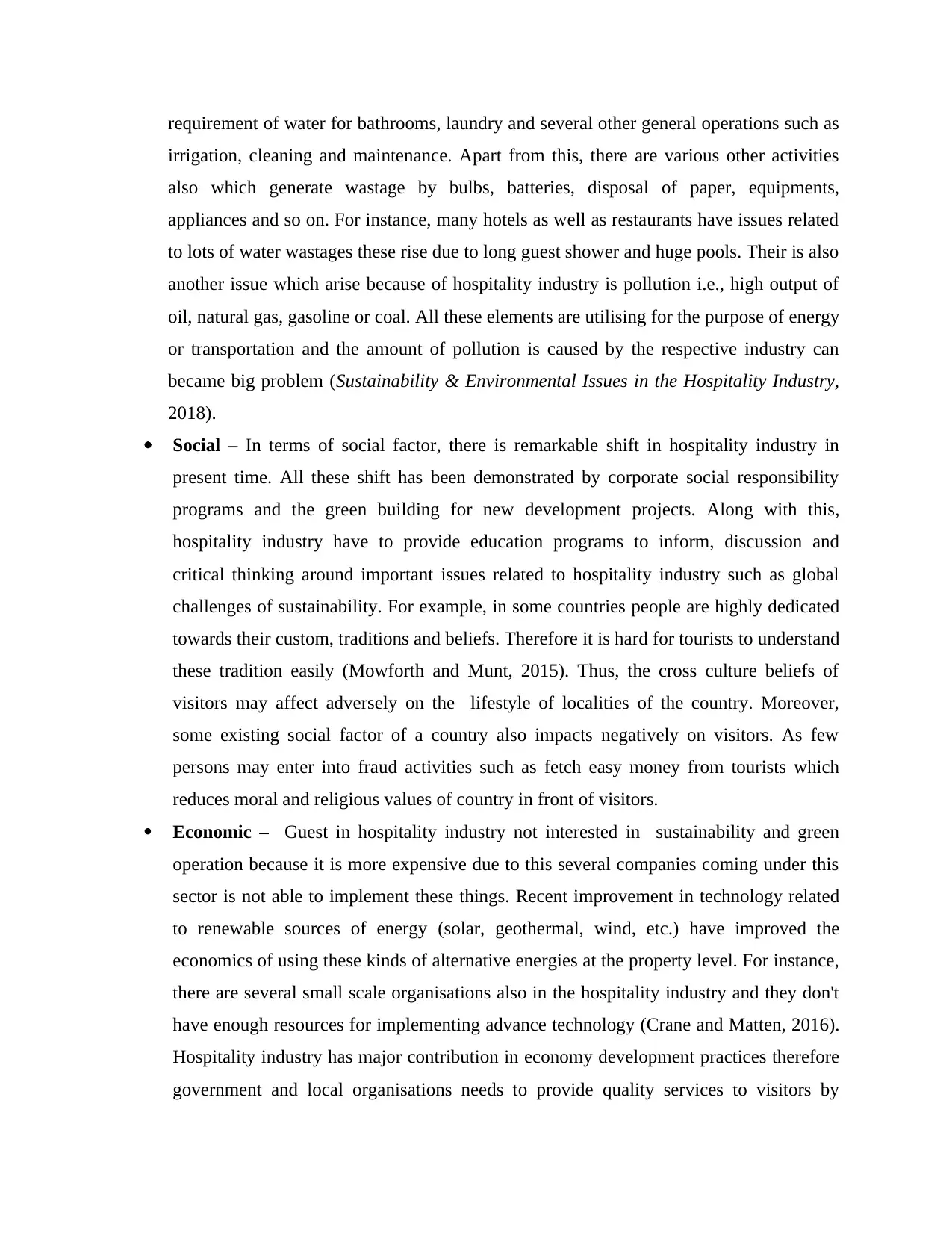
requirement of water for bathrooms, laundry and several other general operations such as
irrigation, cleaning and maintenance. Apart from this, there are various other activities
also which generate wastage by bulbs, batteries, disposal of paper, equipments,
appliances and so on. For instance, many hotels as well as restaurants have issues related
to lots of water wastages these rise due to long guest shower and huge pools. Their is also
another issue which arise because of hospitality industry is pollution i.e., high output of
oil, natural gas, gasoline or coal. All these elements are utilising for the purpose of energy
or transportation and the amount of pollution is caused by the respective industry can
became big problem (Sustainability & Environmental Issues in the Hospitality Industry,
2018).
Social – In terms of social factor, there is remarkable shift in hospitality industry in
present time. All these shift has been demonstrated by corporate social responsibility
programs and the green building for new development projects. Along with this,
hospitality industry have to provide education programs to inform, discussion and
critical thinking around important issues related to hospitality industry such as global
challenges of sustainability. For example, in some countries people are highly dedicated
towards their custom, traditions and beliefs. Therefore it is hard for tourists to understand
these tradition easily (Mowforth and Munt, 2015). Thus, the cross culture beliefs of
visitors may affect adversely on the lifestyle of localities of the country. Moreover,
some existing social factor of a country also impacts negatively on visitors. As few
persons may enter into fraud activities such as fetch easy money from tourists which
reduces moral and religious values of country in front of visitors.
Economic – Guest in hospitality industry not interested in sustainability and green
operation because it is more expensive due to this several companies coming under this
sector is not able to implement these things. Recent improvement in technology related
to renewable sources of energy (solar, geothermal, wind, etc.) have improved the
economics of using these kinds of alternative energies at the property level. For instance,
there are several small scale organisations also in the hospitality industry and they don't
have enough resources for implementing advance technology (Crane and Matten, 2016).
Hospitality industry has major contribution in economy development practices therefore
government and local organisations needs to provide quality services to visitors by
irrigation, cleaning and maintenance. Apart from this, there are various other activities
also which generate wastage by bulbs, batteries, disposal of paper, equipments,
appliances and so on. For instance, many hotels as well as restaurants have issues related
to lots of water wastages these rise due to long guest shower and huge pools. Their is also
another issue which arise because of hospitality industry is pollution i.e., high output of
oil, natural gas, gasoline or coal. All these elements are utilising for the purpose of energy
or transportation and the amount of pollution is caused by the respective industry can
became big problem (Sustainability & Environmental Issues in the Hospitality Industry,
2018).
Social – In terms of social factor, there is remarkable shift in hospitality industry in
present time. All these shift has been demonstrated by corporate social responsibility
programs and the green building for new development projects. Along with this,
hospitality industry have to provide education programs to inform, discussion and
critical thinking around important issues related to hospitality industry such as global
challenges of sustainability. For example, in some countries people are highly dedicated
towards their custom, traditions and beliefs. Therefore it is hard for tourists to understand
these tradition easily (Mowforth and Munt, 2015). Thus, the cross culture beliefs of
visitors may affect adversely on the lifestyle of localities of the country. Moreover,
some existing social factor of a country also impacts negatively on visitors. As few
persons may enter into fraud activities such as fetch easy money from tourists which
reduces moral and religious values of country in front of visitors.
Economic – Guest in hospitality industry not interested in sustainability and green
operation because it is more expensive due to this several companies coming under this
sector is not able to implement these things. Recent improvement in technology related
to renewable sources of energy (solar, geothermal, wind, etc.) have improved the
economics of using these kinds of alternative energies at the property level. For instance,
there are several small scale organisations also in the hospitality industry and they don't
have enough resources for implementing advance technology (Crane and Matten, 2016).
Hospitality industry has major contribution in economy development practices therefore
government and local organisations needs to provide quality services to visitors by
Paraphrase This Document
Need a fresh take? Get an instant paraphrase of this document with our AI Paraphraser
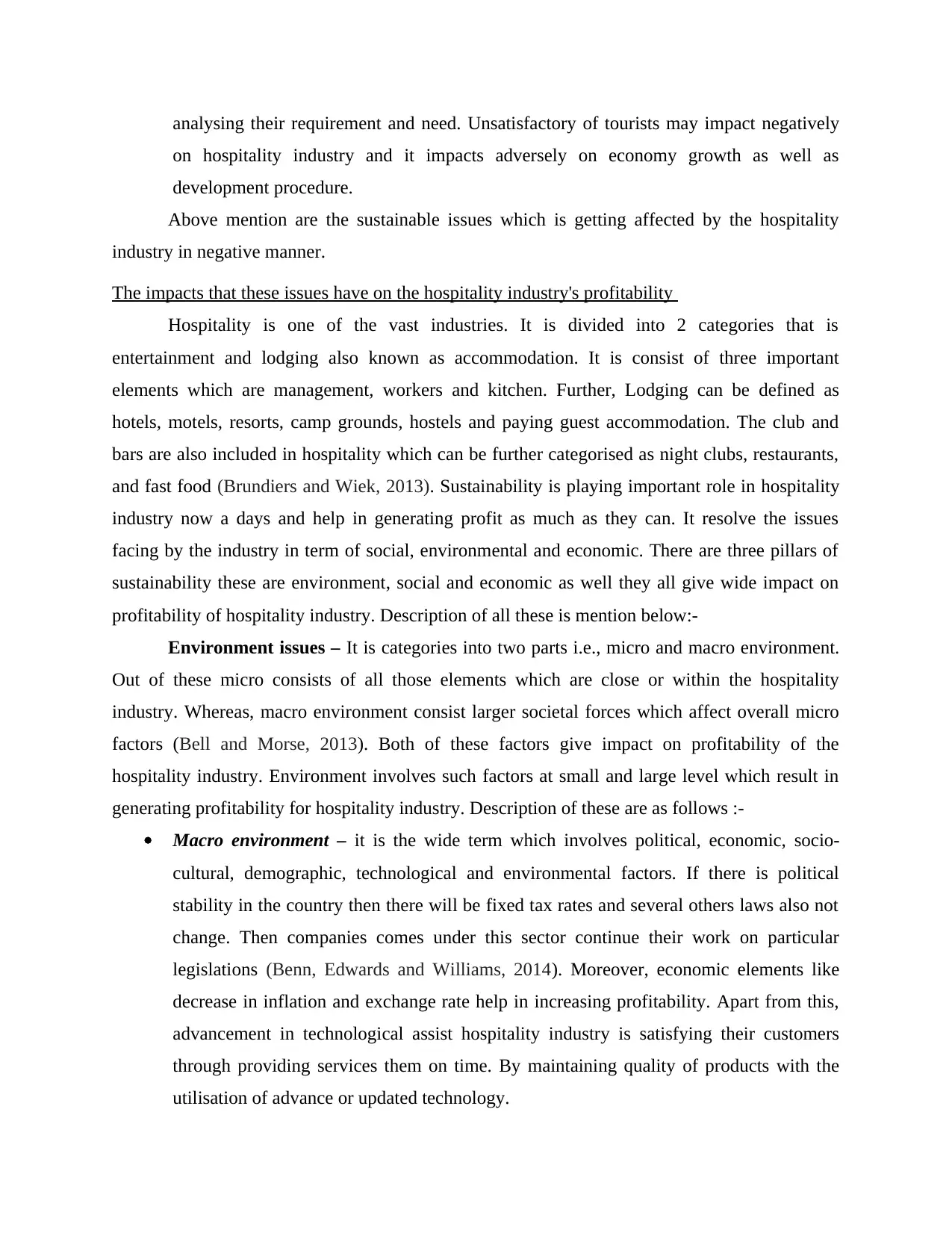
analysing their requirement and need. Unsatisfactory of tourists may impact negatively
on hospitality industry and it impacts adversely on economy growth as well as
development procedure.
Above mention are the sustainable issues which is getting affected by the hospitality
industry in negative manner.
The impacts that these issues have on the hospitality industry's profitability
Hospitality is one of the vast industries. It is divided into 2 categories that is
entertainment and lodging also known as accommodation. It is consist of three important
elements which are management, workers and kitchen. Further, Lodging can be defined as
hotels, motels, resorts, camp grounds, hostels and paying guest accommodation. The club and
bars are also included in hospitality which can be further categorised as night clubs, restaurants,
and fast food (Brundiers and Wiek, 2013). Sustainability is playing important role in hospitality
industry now a days and help in generating profit as much as they can. It resolve the issues
facing by the industry in term of social, environmental and economic. There are three pillars of
sustainability these are environment, social and economic as well they all give wide impact on
profitability of hospitality industry. Description of all these is mention below:-
Environment issues – It is categories into two parts i.e., micro and macro environment.
Out of these micro consists of all those elements which are close or within the hospitality
industry. Whereas, macro environment consist larger societal forces which affect overall micro
factors (Bell and Morse, 2013). Both of these factors give impact on profitability of the
hospitality industry. Environment involves such factors at small and large level which result in
generating profitability for hospitality industry. Description of these are as follows :-
Macro environment – it is the wide term which involves political, economic, socio-
cultural, demographic, technological and environmental factors. If there is political
stability in the country then there will be fixed tax rates and several others laws also not
change. Then companies comes under this sector continue their work on particular
legislations (Benn, Edwards and Williams, 2014). Moreover, economic elements like
decrease in inflation and exchange rate help in increasing profitability. Apart from this,
advancement in technological assist hospitality industry is satisfying their customers
through providing services them on time. By maintaining quality of products with the
utilisation of advance or updated technology.
on hospitality industry and it impacts adversely on economy growth as well as
development procedure.
Above mention are the sustainable issues which is getting affected by the hospitality
industry in negative manner.
The impacts that these issues have on the hospitality industry's profitability
Hospitality is one of the vast industries. It is divided into 2 categories that is
entertainment and lodging also known as accommodation. It is consist of three important
elements which are management, workers and kitchen. Further, Lodging can be defined as
hotels, motels, resorts, camp grounds, hostels and paying guest accommodation. The club and
bars are also included in hospitality which can be further categorised as night clubs, restaurants,
and fast food (Brundiers and Wiek, 2013). Sustainability is playing important role in hospitality
industry now a days and help in generating profit as much as they can. It resolve the issues
facing by the industry in term of social, environmental and economic. There are three pillars of
sustainability these are environment, social and economic as well they all give wide impact on
profitability of hospitality industry. Description of all these is mention below:-
Environment issues – It is categories into two parts i.e., micro and macro environment.
Out of these micro consists of all those elements which are close or within the hospitality
industry. Whereas, macro environment consist larger societal forces which affect overall micro
factors (Bell and Morse, 2013). Both of these factors give impact on profitability of the
hospitality industry. Environment involves such factors at small and large level which result in
generating profitability for hospitality industry. Description of these are as follows :-
Macro environment – it is the wide term which involves political, economic, socio-
cultural, demographic, technological and environmental factors. If there is political
stability in the country then there will be fixed tax rates and several others laws also not
change. Then companies comes under this sector continue their work on particular
legislations (Benn, Edwards and Williams, 2014). Moreover, economic elements like
decrease in inflation and exchange rate help in increasing profitability. Apart from this,
advancement in technological assist hospitality industry is satisfying their customers
through providing services them on time. By maintaining quality of products with the
utilisation of advance or updated technology.
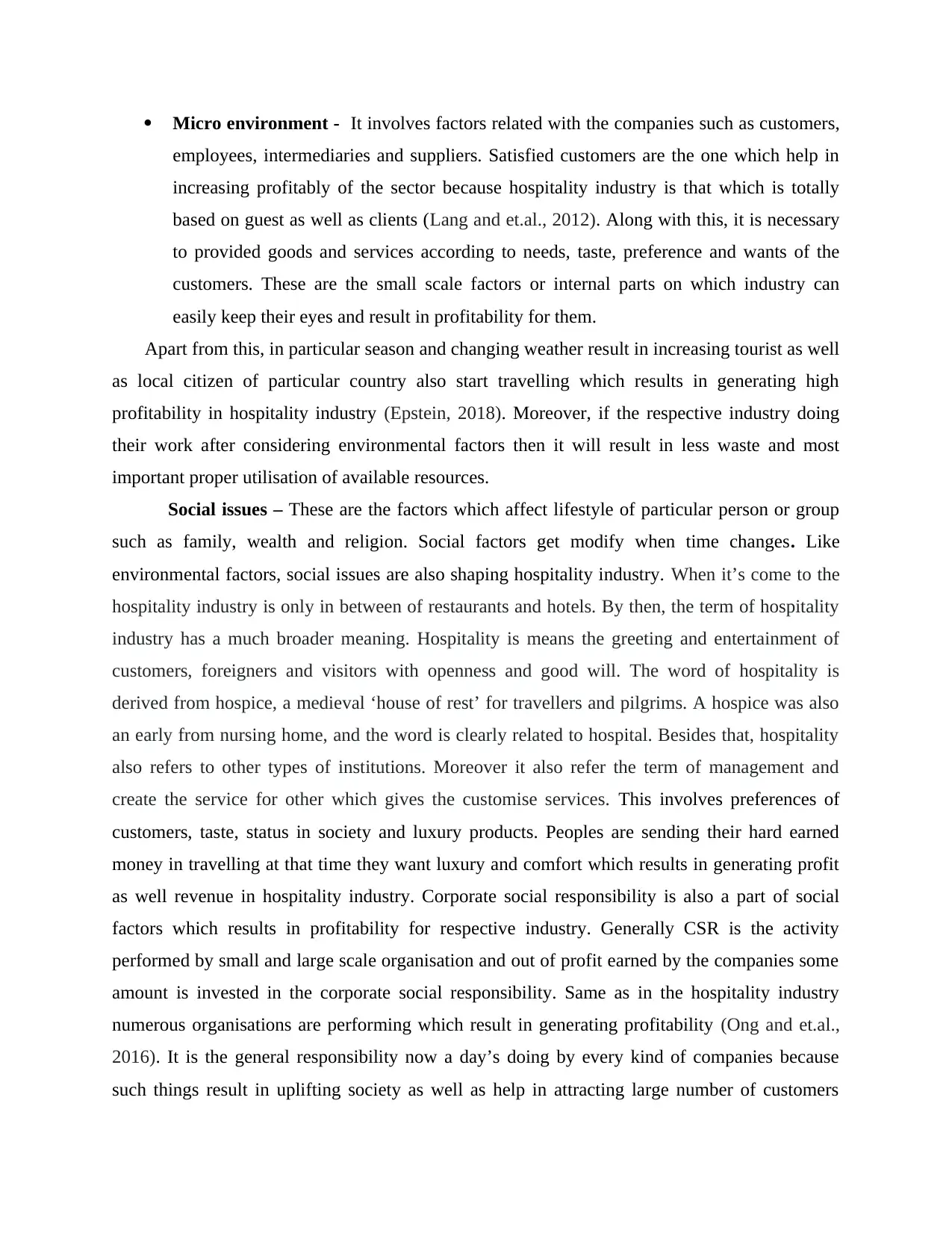
Micro environment - It involves factors related with the companies such as customers,
employees, intermediaries and suppliers. Satisfied customers are the one which help in
increasing profitably of the sector because hospitality industry is that which is totally
based on guest as well as clients (Lang and et.al., 2012). Along with this, it is necessary
to provided goods and services according to needs, taste, preference and wants of the
customers. These are the small scale factors or internal parts on which industry can
easily keep their eyes and result in profitability for them.
Apart from this, in particular season and changing weather result in increasing tourist as well
as local citizen of particular country also start travelling which results in generating high
profitability in hospitality industry (Epstein, 2018). Moreover, if the respective industry doing
their work after considering environmental factors then it will result in less waste and most
important proper utilisation of available resources.
Social issues – These are the factors which affect lifestyle of particular person or group
such as family, wealth and religion. Social factors get modify when time changes. Like
environmental factors, social issues are also shaping hospitality industry. When it’s come to the
hospitality industry is only in between of restaurants and hotels. By then, the term of hospitality
industry has a much broader meaning. Hospitality is means the greeting and entertainment of
customers, foreigners and visitors with openness and good will. The word of hospitality is
derived from hospice, a medieval ‘house of rest’ for travellers and pilgrims. A hospice was also
an early from nursing home, and the word is clearly related to hospital. Besides that, hospitality
also refers to other types of institutions. Moreover it also refer the term of management and
create the service for other which gives the customise services. This involves preferences of
customers, taste, status in society and luxury products. Peoples are sending their hard earned
money in travelling at that time they want luxury and comfort which results in generating profit
as well revenue in hospitality industry. Corporate social responsibility is also a part of social
factors which results in profitability for respective industry. Generally CSR is the activity
performed by small and large scale organisation and out of profit earned by the companies some
amount is invested in the corporate social responsibility. Same as in the hospitality industry
numerous organisations are performing which result in generating profitability (Ong and et.al.,
2016). It is the general responsibility now a day’s doing by every kind of companies because
such things result in uplifting society as well as help in attracting large number of customers
employees, intermediaries and suppliers. Satisfied customers are the one which help in
increasing profitably of the sector because hospitality industry is that which is totally
based on guest as well as clients (Lang and et.al., 2012). Along with this, it is necessary
to provided goods and services according to needs, taste, preference and wants of the
customers. These are the small scale factors or internal parts on which industry can
easily keep their eyes and result in profitability for them.
Apart from this, in particular season and changing weather result in increasing tourist as well
as local citizen of particular country also start travelling which results in generating high
profitability in hospitality industry (Epstein, 2018). Moreover, if the respective industry doing
their work after considering environmental factors then it will result in less waste and most
important proper utilisation of available resources.
Social issues – These are the factors which affect lifestyle of particular person or group
such as family, wealth and religion. Social factors get modify when time changes. Like
environmental factors, social issues are also shaping hospitality industry. When it’s come to the
hospitality industry is only in between of restaurants and hotels. By then, the term of hospitality
industry has a much broader meaning. Hospitality is means the greeting and entertainment of
customers, foreigners and visitors with openness and good will. The word of hospitality is
derived from hospice, a medieval ‘house of rest’ for travellers and pilgrims. A hospice was also
an early from nursing home, and the word is clearly related to hospital. Besides that, hospitality
also refers to other types of institutions. Moreover it also refer the term of management and
create the service for other which gives the customise services. This involves preferences of
customers, taste, status in society and luxury products. Peoples are sending their hard earned
money in travelling at that time they want luxury and comfort which results in generating profit
as well revenue in hospitality industry. Corporate social responsibility is also a part of social
factors which results in profitability for respective industry. Generally CSR is the activity
performed by small and large scale organisation and out of profit earned by the companies some
amount is invested in the corporate social responsibility. Same as in the hospitality industry
numerous organisations are performing which result in generating profitability (Ong and et.al.,
2016). It is the general responsibility now a day’s doing by every kind of companies because
such things result in uplifting society as well as help in attracting large number of customers
⊘ This is a preview!⊘
Do you want full access?
Subscribe today to unlock all pages.

Trusted by 1+ million students worldwide
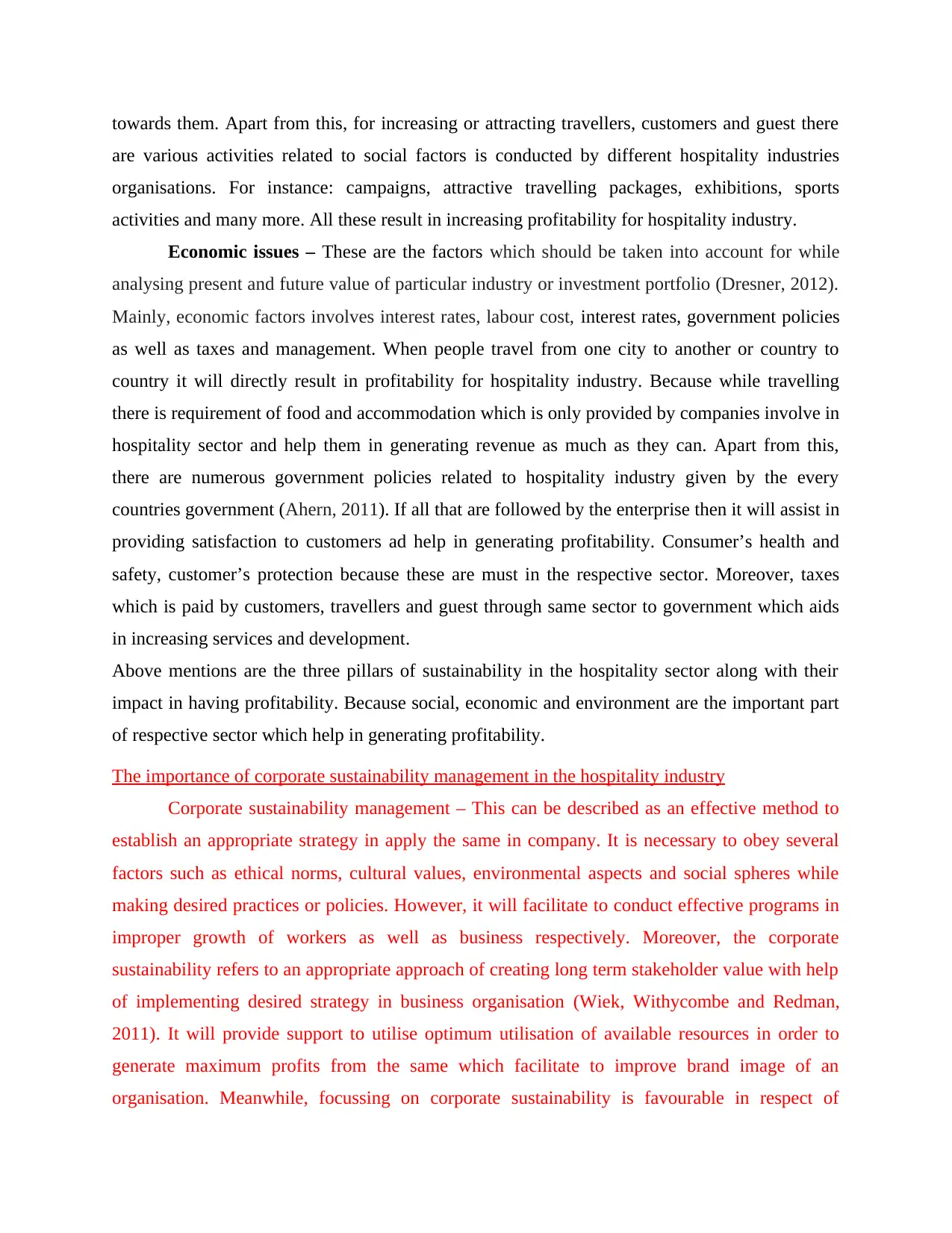
towards them. Apart from this, for increasing or attracting travellers, customers and guest there
are various activities related to social factors is conducted by different hospitality industries
organisations. For instance: campaigns, attractive travelling packages, exhibitions, sports
activities and many more. All these result in increasing profitability for hospitality industry.
Economic issues – These are the factors which should be taken into account for while
analysing present and future value of particular industry or investment portfolio (Dresner, 2012).
Mainly, economic factors involves interest rates, labour cost, interest rates, government policies
as well as taxes and management. When people travel from one city to another or country to
country it will directly result in profitability for hospitality industry. Because while travelling
there is requirement of food and accommodation which is only provided by companies involve in
hospitality sector and help them in generating revenue as much as they can. Apart from this,
there are numerous government policies related to hospitality industry given by the every
countries government (Ahern, 2011). If all that are followed by the enterprise then it will assist in
providing satisfaction to customers ad help in generating profitability. Consumer’s health and
safety, customer’s protection because these are must in the respective sector. Moreover, taxes
which is paid by customers, travellers and guest through same sector to government which aids
in increasing services and development.
Above mentions are the three pillars of sustainability in the hospitality sector along with their
impact in having profitability. Because social, economic and environment are the important part
of respective sector which help in generating profitability.
The importance of corporate sustainability management in the hospitality industry
Corporate sustainability management – This can be described as an effective method to
establish an appropriate strategy in apply the same in company. It is necessary to obey several
factors such as ethical norms, cultural values, environmental aspects and social spheres while
making desired practices or policies. However, it will facilitate to conduct effective programs in
improper growth of workers as well as business respectively. Moreover, the corporate
sustainability refers to an appropriate approach of creating long term stakeholder value with help
of implementing desired strategy in business organisation (Wiek, Withycombe and Redman,
2011). It will provide support to utilise optimum utilisation of available resources in order to
generate maximum profits from the same which facilitate to improve brand image of an
organisation. Meanwhile, focussing on corporate sustainability is favourable in respect of
are various activities related to social factors is conducted by different hospitality industries
organisations. For instance: campaigns, attractive travelling packages, exhibitions, sports
activities and many more. All these result in increasing profitability for hospitality industry.
Economic issues – These are the factors which should be taken into account for while
analysing present and future value of particular industry or investment portfolio (Dresner, 2012).
Mainly, economic factors involves interest rates, labour cost, interest rates, government policies
as well as taxes and management. When people travel from one city to another or country to
country it will directly result in profitability for hospitality industry. Because while travelling
there is requirement of food and accommodation which is only provided by companies involve in
hospitality sector and help them in generating revenue as much as they can. Apart from this,
there are numerous government policies related to hospitality industry given by the every
countries government (Ahern, 2011). If all that are followed by the enterprise then it will assist in
providing satisfaction to customers ad help in generating profitability. Consumer’s health and
safety, customer’s protection because these are must in the respective sector. Moreover, taxes
which is paid by customers, travellers and guest through same sector to government which aids
in increasing services and development.
Above mentions are the three pillars of sustainability in the hospitality sector along with their
impact in having profitability. Because social, economic and environment are the important part
of respective sector which help in generating profitability.
The importance of corporate sustainability management in the hospitality industry
Corporate sustainability management – This can be described as an effective method to
establish an appropriate strategy in apply the same in company. It is necessary to obey several
factors such as ethical norms, cultural values, environmental aspects and social spheres while
making desired practices or policies. However, it will facilitate to conduct effective programs in
improper growth of workers as well as business respectively. Moreover, the corporate
sustainability refers to an appropriate approach of creating long term stakeholder value with help
of implementing desired strategy in business organisation (Wiek, Withycombe and Redman,
2011). It will provide support to utilise optimum utilisation of available resources in order to
generate maximum profits from the same which facilitate to improve brand image of an
organisation. Meanwhile, focussing on corporate sustainability is favourable in respect of
Paraphrase This Document
Need a fresh take? Get an instant paraphrase of this document with our AI Paraphraser
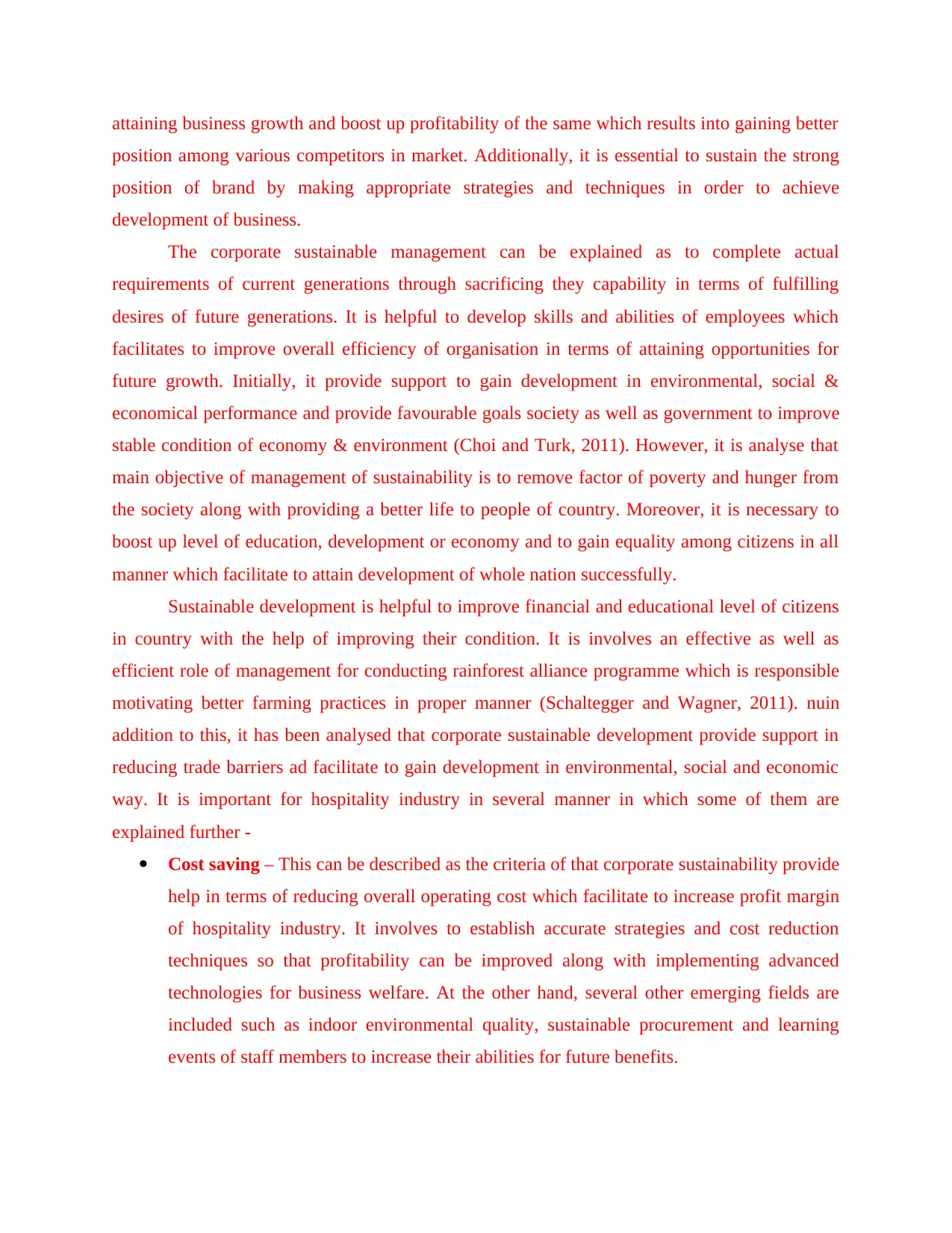
attaining business growth and boost up profitability of the same which results into gaining better
position among various competitors in market. Additionally, it is essential to sustain the strong
position of brand by making appropriate strategies and techniques in order to achieve
development of business.
The corporate sustainable management can be explained as to complete actual
requirements of current generations through sacrificing they capability in terms of fulfilling
desires of future generations. It is helpful to develop skills and abilities of employees which
facilitates to improve overall efficiency of organisation in terms of attaining opportunities for
future growth. Initially, it provide support to gain development in environmental, social &
economical performance and provide favourable goals society as well as government to improve
stable condition of economy & environment (Choi and Turk, 2011). However, it is analyse that
main objective of management of sustainability is to remove factor of poverty and hunger from
the society along with providing a better life to people of country. Moreover, it is necessary to
boost up level of education, development or economy and to gain equality among citizens in all
manner which facilitate to attain development of whole nation successfully.
Sustainable development is helpful to improve financial and educational level of citizens
in country with the help of improving their condition. It is involves an effective as well as
efficient role of management for conducting rainforest alliance programme which is responsible
motivating better farming practices in proper manner (Schaltegger and Wagner, 2011). nuin
addition to this, it has been analysed that corporate sustainable development provide support in
reducing trade barriers ad facilitate to gain development in environmental, social and economic
way. It is important for hospitality industry in several manner in which some of them are
explained further -
Cost saving – This can be described as the criteria of that corporate sustainability provide
help in terms of reducing overall operating cost which facilitate to increase profit margin
of hospitality industry. It involves to establish accurate strategies and cost reduction
techniques so that profitability can be improved along with implementing advanced
technologies for business welfare. At the other hand, several other emerging fields are
included such as indoor environmental quality, sustainable procurement and learning
events of staff members to increase their abilities for future benefits.
position among various competitors in market. Additionally, it is essential to sustain the strong
position of brand by making appropriate strategies and techniques in order to achieve
development of business.
The corporate sustainable management can be explained as to complete actual
requirements of current generations through sacrificing they capability in terms of fulfilling
desires of future generations. It is helpful to develop skills and abilities of employees which
facilitates to improve overall efficiency of organisation in terms of attaining opportunities for
future growth. Initially, it provide support to gain development in environmental, social &
economical performance and provide favourable goals society as well as government to improve
stable condition of economy & environment (Choi and Turk, 2011). However, it is analyse that
main objective of management of sustainability is to remove factor of poverty and hunger from
the society along with providing a better life to people of country. Moreover, it is necessary to
boost up level of education, development or economy and to gain equality among citizens in all
manner which facilitate to attain development of whole nation successfully.
Sustainable development is helpful to improve financial and educational level of citizens
in country with the help of improving their condition. It is involves an effective as well as
efficient role of management for conducting rainforest alliance programme which is responsible
motivating better farming practices in proper manner (Schaltegger and Wagner, 2011). nuin
addition to this, it has been analysed that corporate sustainable development provide support in
reducing trade barriers ad facilitate to gain development in environmental, social and economic
way. It is important for hospitality industry in several manner in which some of them are
explained further -
Cost saving – This can be described as the criteria of that corporate sustainability provide
help in terms of reducing overall operating cost which facilitate to increase profit margin
of hospitality industry. It involves to establish accurate strategies and cost reduction
techniques so that profitability can be improved along with implementing advanced
technologies for business welfare. At the other hand, several other emerging fields are
included such as indoor environmental quality, sustainable procurement and learning
events of staff members to increase their abilities for future benefits.
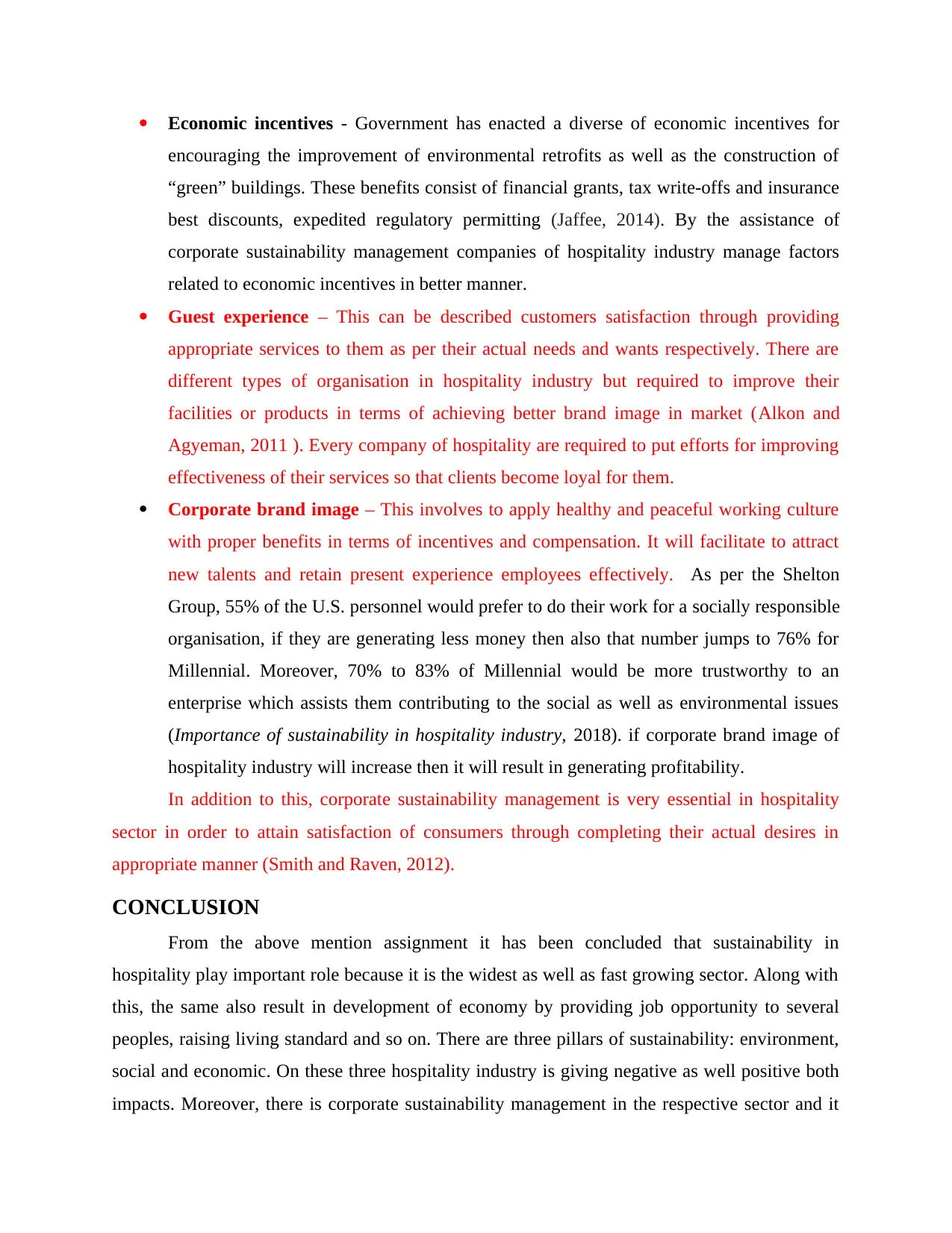
Economic incentives - Government has enacted a diverse of economic incentives for
encouraging the improvement of environmental retrofits as well as the construction of
“green” buildings. These benefits consist of financial grants, tax write-offs and insurance
best discounts, expedited regulatory permitting (Jaffee, 2014). By the assistance of
corporate sustainability management companies of hospitality industry manage factors
related to economic incentives in better manner.
Guest experience – This can be described customers satisfaction through providing
appropriate services to them as per their actual needs and wants respectively. There are
different types of organisation in hospitality industry but required to improve their
facilities or products in terms of achieving better brand image in market (Alkon and
Agyeman, 2011 ). Every company of hospitality are required to put efforts for improving
effectiveness of their services so that clients become loyal for them.
Corporate brand image – This involves to apply healthy and peaceful working culture
with proper benefits in terms of incentives and compensation. It will facilitate to attract
new talents and retain present experience employees effectively. As per the Shelton
Group, 55% of the U.S. personnel would prefer to do their work for a socially responsible
organisation, if they are generating less money then also that number jumps to 76% for
Millennial. Moreover, 70% to 83% of Millennial would be more trustworthy to an
enterprise which assists them contributing to the social as well as environmental issues
(Importance of sustainability in hospitality industry, 2018). if corporate brand image of
hospitality industry will increase then it will result in generating profitability.
In addition to this, corporate sustainability management is very essential in hospitality
sector in order to attain satisfaction of consumers through completing their actual desires in
appropriate manner (Smith and Raven, 2012).
CONCLUSION
From the above mention assignment it has been concluded that sustainability in
hospitality play important role because it is the widest as well as fast growing sector. Along with
this, the same also result in development of economy by providing job opportunity to several
peoples, raising living standard and so on. There are three pillars of sustainability: environment,
social and economic. On these three hospitality industry is giving negative as well positive both
impacts. Moreover, there is corporate sustainability management in the respective sector and it
encouraging the improvement of environmental retrofits as well as the construction of
“green” buildings. These benefits consist of financial grants, tax write-offs and insurance
best discounts, expedited regulatory permitting (Jaffee, 2014). By the assistance of
corporate sustainability management companies of hospitality industry manage factors
related to economic incentives in better manner.
Guest experience – This can be described customers satisfaction through providing
appropriate services to them as per their actual needs and wants respectively. There are
different types of organisation in hospitality industry but required to improve their
facilities or products in terms of achieving better brand image in market (Alkon and
Agyeman, 2011 ). Every company of hospitality are required to put efforts for improving
effectiveness of their services so that clients become loyal for them.
Corporate brand image – This involves to apply healthy and peaceful working culture
with proper benefits in terms of incentives and compensation. It will facilitate to attract
new talents and retain present experience employees effectively. As per the Shelton
Group, 55% of the U.S. personnel would prefer to do their work for a socially responsible
organisation, if they are generating less money then also that number jumps to 76% for
Millennial. Moreover, 70% to 83% of Millennial would be more trustworthy to an
enterprise which assists them contributing to the social as well as environmental issues
(Importance of sustainability in hospitality industry, 2018). if corporate brand image of
hospitality industry will increase then it will result in generating profitability.
In addition to this, corporate sustainability management is very essential in hospitality
sector in order to attain satisfaction of consumers through completing their actual desires in
appropriate manner (Smith and Raven, 2012).
CONCLUSION
From the above mention assignment it has been concluded that sustainability in
hospitality play important role because it is the widest as well as fast growing sector. Along with
this, the same also result in development of economy by providing job opportunity to several
peoples, raising living standard and so on. There are three pillars of sustainability: environment,
social and economic. On these three hospitality industry is giving negative as well positive both
impacts. Moreover, there is corporate sustainability management in the respective sector and it
⊘ This is a preview!⊘
Do you want full access?
Subscribe today to unlock all pages.

Trusted by 1+ million students worldwide

also have some significant. These are cost saving, experience of guest, economic incentives and
corporate brand image. All these are important or necessary for hospitality sector companies in
generating profitability.
corporate brand image. All these are important or necessary for hospitality sector companies in
generating profitability.
Paraphrase This Document
Need a fresh take? Get an instant paraphrase of this document with our AI Paraphraser
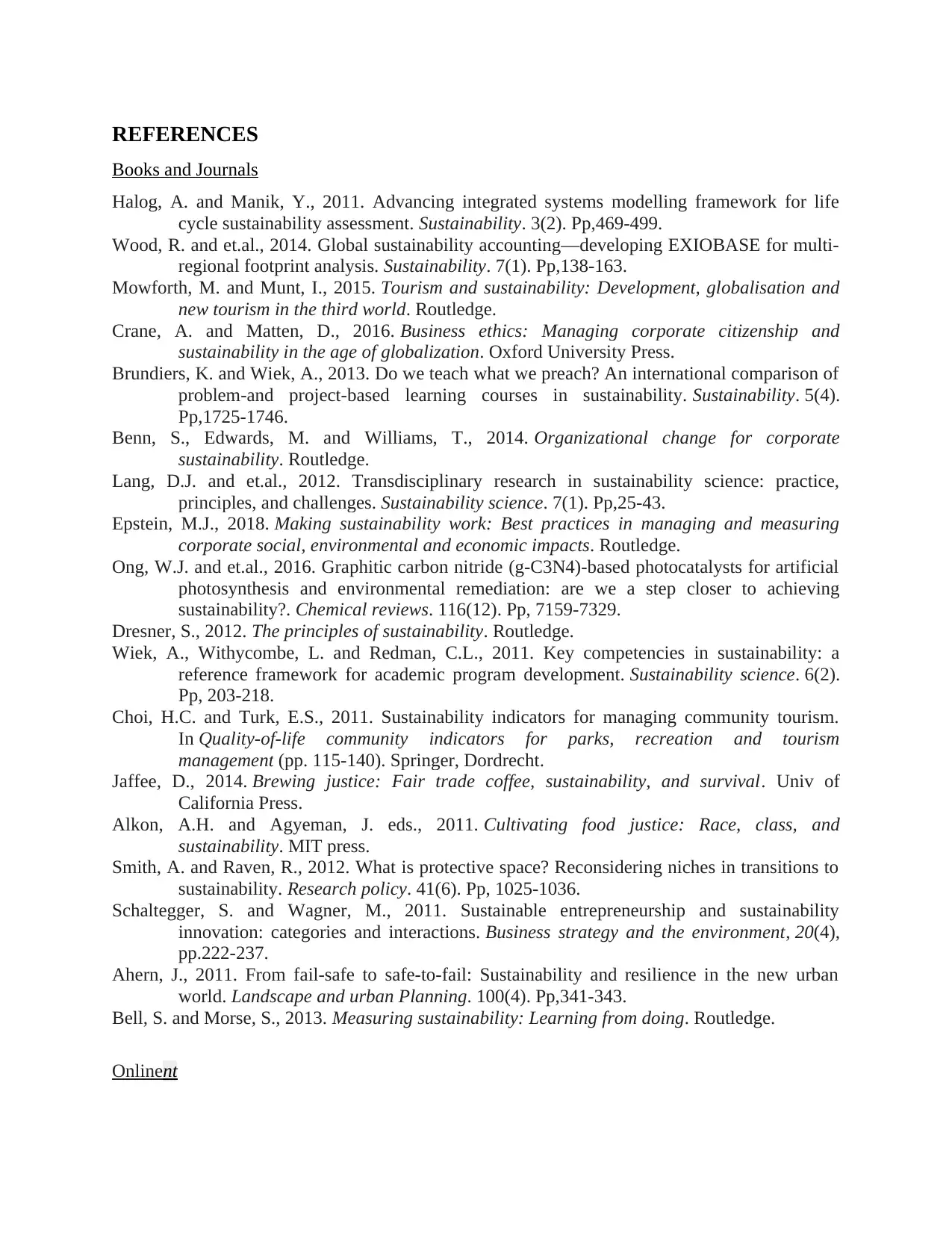
REFERENCES
Books and Journals
Halog, A. and Manik, Y., 2011. Advancing integrated systems modelling framework for life
cycle sustainability assessment. Sustainability. 3(2). Pp,469-499.
Wood, R. and et.al., 2014. Global sustainability accounting—developing EXIOBASE for multi-
regional footprint analysis. Sustainability. 7(1). Pp,138-163.
Mowforth, M. and Munt, I., 2015. Tourism and sustainability: Development, globalisation and
new tourism in the third world. Routledge.
Crane, A. and Matten, D., 2016. Business ethics: Managing corporate citizenship and
sustainability in the age of globalization. Oxford University Press.
Brundiers, K. and Wiek, A., 2013. Do we teach what we preach? An international comparison of
problem-and project-based learning courses in sustainability. Sustainability. 5(4).
Pp,1725-1746.
Benn, S., Edwards, M. and Williams, T., 2014. Organizational change for corporate
sustainability. Routledge.
Lang, D.J. and et.al., 2012. Transdisciplinary research in sustainability science: practice,
principles, and challenges. Sustainability science. 7(1). Pp,25-43.
Epstein, M.J., 2018. Making sustainability work: Best practices in managing and measuring
corporate social, environmental and economic impacts. Routledge.
Ong, W.J. and et.al., 2016. Graphitic carbon nitride (g-C3N4)-based photocatalysts for artificial
photosynthesis and environmental remediation: are we a step closer to achieving
sustainability?. Chemical reviews. 116(12). Pp, 7159-7329.
Dresner, S., 2012. The principles of sustainability. Routledge.
Wiek, A., Withycombe, L. and Redman, C.L., 2011. Key competencies in sustainability: a
reference framework for academic program development. Sustainability science. 6(2).
Pp, 203-218.
Choi, H.C. and Turk, E.S., 2011. Sustainability indicators for managing community tourism.
In Quality-of-life community indicators for parks, recreation and tourism
management (pp. 115-140). Springer, Dordrecht.
Jaffee, D., 2014. Brewing justice: Fair trade coffee, sustainability, and survival. Univ of
California Press.
Alkon, A.H. and Agyeman, J. eds., 2011. Cultivating food justice: Race, class, and
sustainability. MIT press.
Smith, A. and Raven, R., 2012. What is protective space? Reconsidering niches in transitions to
sustainability. Research policy. 41(6). Pp, 1025-1036.
Schaltegger, S. and Wagner, M., 2011. Sustainable entrepreneurship and sustainability
innovation: categories and interactions. Business strategy and the environment, 20(4),
pp.222-237.
Ahern, J., 2011. From fail-safe to safe-to-fail: Sustainability and resilience in the new urban
world. Landscape and urban Planning. 100(4). Pp,341-343.
Bell, S. and Morse, S., 2013. Measuring sustainability: Learning from doing. Routledge.
Onlinent
Books and Journals
Halog, A. and Manik, Y., 2011. Advancing integrated systems modelling framework for life
cycle sustainability assessment. Sustainability. 3(2). Pp,469-499.
Wood, R. and et.al., 2014. Global sustainability accounting—developing EXIOBASE for multi-
regional footprint analysis. Sustainability. 7(1). Pp,138-163.
Mowforth, M. and Munt, I., 2015. Tourism and sustainability: Development, globalisation and
new tourism in the third world. Routledge.
Crane, A. and Matten, D., 2016. Business ethics: Managing corporate citizenship and
sustainability in the age of globalization. Oxford University Press.
Brundiers, K. and Wiek, A., 2013. Do we teach what we preach? An international comparison of
problem-and project-based learning courses in sustainability. Sustainability. 5(4).
Pp,1725-1746.
Benn, S., Edwards, M. and Williams, T., 2014. Organizational change for corporate
sustainability. Routledge.
Lang, D.J. and et.al., 2012. Transdisciplinary research in sustainability science: practice,
principles, and challenges. Sustainability science. 7(1). Pp,25-43.
Epstein, M.J., 2018. Making sustainability work: Best practices in managing and measuring
corporate social, environmental and economic impacts. Routledge.
Ong, W.J. and et.al., 2016. Graphitic carbon nitride (g-C3N4)-based photocatalysts for artificial
photosynthesis and environmental remediation: are we a step closer to achieving
sustainability?. Chemical reviews. 116(12). Pp, 7159-7329.
Dresner, S., 2012. The principles of sustainability. Routledge.
Wiek, A., Withycombe, L. and Redman, C.L., 2011. Key competencies in sustainability: a
reference framework for academic program development. Sustainability science. 6(2).
Pp, 203-218.
Choi, H.C. and Turk, E.S., 2011. Sustainability indicators for managing community tourism.
In Quality-of-life community indicators for parks, recreation and tourism
management (pp. 115-140). Springer, Dordrecht.
Jaffee, D., 2014. Brewing justice: Fair trade coffee, sustainability, and survival. Univ of
California Press.
Alkon, A.H. and Agyeman, J. eds., 2011. Cultivating food justice: Race, class, and
sustainability. MIT press.
Smith, A. and Raven, R., 2012. What is protective space? Reconsidering niches in transitions to
sustainability. Research policy. 41(6). Pp, 1025-1036.
Schaltegger, S. and Wagner, M., 2011. Sustainable entrepreneurship and sustainability
innovation: categories and interactions. Business strategy and the environment, 20(4),
pp.222-237.
Ahern, J., 2011. From fail-safe to safe-to-fail: Sustainability and resilience in the new urban
world. Landscape and urban Planning. 100(4). Pp,341-343.
Bell, S. and Morse, S., 2013. Measuring sustainability: Learning from doing. Routledge.
Onlinent

Sustainability & Environmental Issues in the Hospitality Industry, 2018.[Online].Available
Through<https://study.com/academy/lesson/sustainability-environmental-issues-in-the-
hospitality-industry.html>
Importance of sustainability in hospitality industry,2018.[Online].Available Through<
https://www.danacommunications.com/importance-of-sustainability-in-the-hospitality-
industry/>
Through<https://study.com/academy/lesson/sustainability-environmental-issues-in-the-
hospitality-industry.html>
Importance of sustainability in hospitality industry,2018.[Online].Available Through<
https://www.danacommunications.com/importance-of-sustainability-in-the-hospitality-
industry/>
⊘ This is a preview!⊘
Do you want full access?
Subscribe today to unlock all pages.

Trusted by 1+ million students worldwide
1 out of 12
Related Documents
Your All-in-One AI-Powered Toolkit for Academic Success.
+13062052269
info@desklib.com
Available 24*7 on WhatsApp / Email
![[object Object]](/_next/static/media/star-bottom.7253800d.svg)
Unlock your academic potential
Copyright © 2020–2026 A2Z Services. All Rights Reserved. Developed and managed by ZUCOL.





